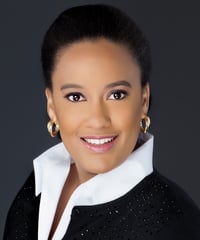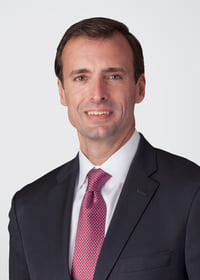Lillian S. Hardy
Partner, Hogan Lovells
As I have practiced law, I have come to recognize which things within the law are most complimentary of my personality. It was clear early on that I had always been used to speaking up about difficult issues, but just as well, I’ve always been willing to solve difficult issues. And that’s really what my job is from day to day.
Some days, people kind of forget that corporations have issues that are beyond their balance sheet. They know that if someone rapes an employee on the grounds or if someone tries to overdose on a company product or if there’s a ‘me too’ incident with a very high-level employee, all those things require specific analysis, both from a legal perspective and a human perspective. And that’s really my sweet spot—when those kinds of human and people considerations are made at the same time as the legal strategy.
In law school, I had decided that I would like to be a federal public defender. I wanted to help with the issues that no one wanted to sort out and represent the people who no one wanted to represent. However, when I entered the law firm world, I found that sort of feeling and that sort of skill set can be built in a corporate law firm; it’s just a different audience and a different set of issues.
So, almost two years ago, I designed and launched an independent practice area at Hogan Lovells dedicated to crisis management. I decided to do that, apart from the investigations and litigation and government relations practices that we already had, because I saw an increase in the use of various technologies and widespread reliance on social media leading to rapid-fire incidents that required a particular legal strategy. It was different than what had been traditionally required. So, while I can’t say I predicted we’d be in a global health pandemic, I knew at the bottom of my heart that we would be increasingly confronting issues as a profession—as lawyers—that were more and more intense. Those issues would require a certain instinct and rapid cadence, which I call the ‘crisis cadence.’
During the pandemic, people on the crisis leadership team who were already used to high-intensity legal engagements are seeing even more incidents that are crisis level today than they were five months ago. The clients are making decisions that they’ll have to stick with and be remembered for positively or negatively forever. We have to be comfortable in making those judgements very quickly. I never could have imagined that it would be something this big, but we’ve become accustomed to that crisis cadence and really going all out for your client in whatever capacity, regardless of what happens.
Willy Ferrer
Chair of Holland & Knight’s Global Compliance and Investigations Team and the Executive Partner of the firm’s Miami office
I was very much influenced as a child from my parents and how they lived their lives. They fled Cuba in search of freedom, wanting a better future and life for me and my brother. My parents always taught me that even though they were not from this country, that we were not going to sit on the sidelines. They were very much about giving back to the community that welcomed them.
I always felt this incredible pride about being an American, because to me being an American was about opening your doors to others and helping them. So, I had a heartfelt moral obligation to give back to my country and to the community that gave my family and me so much. I was very involved in community service projects growing up. Then when I went to law school, I was very interested in how the legal profession could help those who are in need. Public service was ingrained in me because of everything I saw my parents do and their belief that what matters is the kind of person you are—that’s going to define you.
After I graduated, I clerked for a federal judge, went to a law firm and then I applied for the White House Fellowship, which is a one-year fellowship in Washington, D.C., where you get to be an assistant to a cabinet member or someone at the White House.
That changed my life. I became an assistant to HUD Secretary Henry Cisneros, and then I got a chance to be the deputy chief of staff to Janet Reno when she was the attorney general of the United States. When that public interest bug bit me at that point, there was no looking back. I was able to see at a macro level what public service and a legal career in the government can do to try to help people’s lives be a little bit better.
Then I went back to Miami as a federal prosecutor to do trial work. I did that as an assistant U.S. attorney and then under the Obama administration as the U.S. attorney for South Florida. When you’re the U.S. attorney, your primary job is to enforce the law, but you also have to be a part of the solution. During the whole experience, the biggest lesson I learned was that you have to take a holistic approach in trying to break the cycle of violence and crime. I learned that only happens when a prosecutor builds a very close relationship with their community. You can’t solve every problem, but you’ve got to do whatever you can within your authority and your responsibilities.
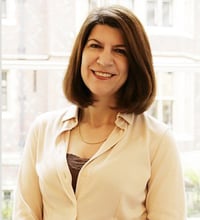 Deborah Rasin
Deborah Rasin
Chief Legal Officer and Secretary, Hillrom
My role here at Hillrom is definitely the highlight of my professional career. I’ve had great experiences throughout my career, all over the world, and have gained valuable perspective on people and problem-solving with each opportunity. Leading the legal function at Hillrom feels like the culmination of everything that I’ve worked toward. Every experience has been great in terms of growth and development—and I believe that we’re always growing and learning. Here, I love that there are constant opportunities to do new things and to solve new problems.
Culture is so important, and Hillrom has a wonderful culture that is supportive, empowering, inclusive and collaborative. I have a team of peers whom I respect, and we all work together. My own team is incredibly engaged, professional, smart and hardworking.
I take a lot of pride in my team. I am a big supporter of the people who work for me, and I’m fortunate to lead this group of legal and compliance professionals. I try to empower them to apply their own experiences and judgment to solve the challenges that they’re dealing with in their roles. I try not to micromanage—these are talented, highly capable professionals; instead, I try to help guide rather than get into the details of their work. I want them to be leaders themselves because leadership is not just about managing a team of people. Leadership is about stepping up in any situation and using your influence to create a positive outcome.
For me, Hillrom is the whole package. It’s the culture, the nature of the professional challenges we have to solve and the people I get to work with every day.
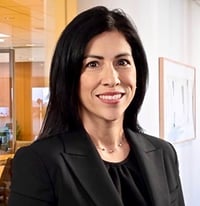 Marcia Valente
Marcia Valente
Associate, Arnold & Porter
My family played a large role in shaping my interest in law and business. My parents are immigrants from Mexico. Growing up there were always conversations with my parents and siblings about current events and social justice. These stories captivated me, and I knew from an early age that, armed with a legal education, I could have power to effect change.
When I was in grade school, my father obtained his contractor’s license and started his own business in construction and real estate. After attending Stanford for my undergraduate education, I joined my older brothers and helped manage the growing family business.
Ultimately, my work experience for my family business confirmed my interest in business law and litigation. Not only was it familiar to me, but I also knew that working at a global law firm as a commercial litigator would provide a platform to work on a variety of interesting cases for both commercial and pro bono clients.
After starting my legal career at Morrison & Foerster in New York City, I took time off to raise my three daughters. I always knew that I wanted to continue practicing law but was uncertain of the options available to me in light of my time away. But in 2017, two key events laid the groundwork for my return.
First, I received an email from the Stanford Alumni Association about the iRelaunch Return to Work Conference. iRelaunch works with companies to build and expand return-to-work programs and provides individuals who are looking to return to work after a career break with tools and resources to make the transition effectively. This conference introduced me to many other well-educated women and showed me that employers were interested in helping women relaunch their careers.
Second, during this same time, I met Caren Stacy, CEO of Diversity Lab. Caren and I serendipitously met in our neighborhood’s downtown. She explained that her company’s mission was to increase the representation of women in law, and one of her signature projects—the OnRamp Fellowship—was the first “Returnship” ever launched for women in law firms. Caren made me realize that it was possible for women like me to relaunch their legal careers.
In 2018, I was hired as a litigation associate in the San Francisco office of Arnold & Porter. Although I worked in various leadership positions for nonprofit organizations during my time away from law, transitioning back into practicing was overwhelming in the beginning. The biggest challenge was admittedly on my end. I needed to remind myself that I still had the ability and drive to excel as a litigator. Fortunately, my transition back into practicing was facilitated by colleagues who believed in me and provided me the resources to excel.
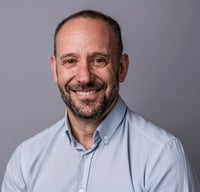 Mark Schwartz
Mark Schwartz
VP & Associate General Counsel, Global Operations & International, Vontier
I always aspired to be in business in some way, shape or form.
After five years in a litigation firm and a year in London, I realized I wasn’t going to work in a law firm forever. I started to think about the next step, and I went for a few purely commercial roles outside the law. But I realized that without any additional qualifications, I would always be the candidate who was hopefully impressive but they would go with someone else with experience. So, two years on, I resolved to pursue an MBA. That, at the time, was my exit from the law at age 31.
After getting my MBA, I banged on the door of Virgin and got a role supporting one of their startups, which carried me through for a very exciting couple of years. And then I left to start a GPS tracking company that was funded by an old client of mine in the UK. The startup ticked a lot of boxes, and over the next nine years, it was quite a ride.
We literally started it from scratch with some seed funding, and we had operations across UK/Norway. There were times when we almost ran out of money. There were times when we did big deals and the world was a great place. It was a very broad experience in so many ways, and it included managing people and dealing with investors to effectively being HR director, finance director, legal director and COO.
I did that for nine years, and then we ultimately sold to a UK public company that was looking to expand. They didn’t have a lawyer on staff, so they asked me if I would take a broader role within the group to effectively be GC. So, I then found myself in a hybrid legal role, where I was able to utilize my commercial skills and my business skills, as well as my legal skills.
It wasn’t long before I realized that this was actually a neat combination where I was part businessman, part lawyer, part of the management team and part of the inner circle. It worked really well.
So, for the past 12 years, in parallel with a series of M&A transactions (we took the UK public company private and then sold it to a U.S. public company in 2013, in addition to a number of M&A transactions since), I’ve been in this hybrid role, now as VP and associate general counsel of Vontier—an $8 billion in revenue company that is currently in the process of separation from Fortive Corp. I see my career almost in three thirds: it was traditional private practice, then business and then the GC role I’m in now.

